Madlener House
4 West Burton Place
Chicago, Illinois 60610
Telephone: 312.787.4071
info@grahamfoundation.org
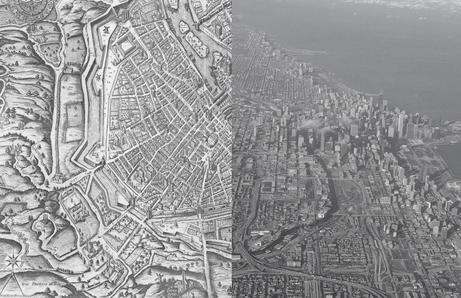
This symposium will bring together a roster of international scholars to examine challenges and opportunities presented by the comparative study of cities across the globe from the sixteenth century to the present. The opening panel discussion at the Graham Foundation will feature Reinhold Martin, Nancy Steinhardt, and Kenny Cupers.
Reinhold Martin is Professor of Architecture at the Graduate School of Architecture, Planning, and Preservation at Columbia University and Director of the Temple Hoyne Buell Center for the Study of American Architecture.
Nancy Steinhardt is Chair of the Department of East Asian Languages and Cultures at the University of Pennsylvania and Professor of East Asian Art in Penn’s History of Art Department.
Kenny Cupers is Head of Urban Studies and Professor of History and Theory of Architecture at the University of Basel, Switzerland.
Ayala Levin, Assistant Professor in the Department of Art History at Northwestern University, will moderate the panel.
The symposium continues on May 18 at the Northwestern University Library in Evanston. The event at Northwestern is free but separate registration is required. To register for the full symposium, click here.
Image: Left: Vassallieu dit Nicolay, Map of Paris, 1609. Bibliothèque national de France, Paris; right: Aerial view of Chicago. Jesús Escobar
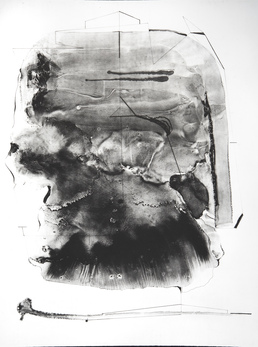
Torkwase Dyson, “Looking for the People (Water Table Ocular #3),” 2017. Polymer gravure on Hahnmuhle Copperplate White paper. Published by Brodsky Center. Collaborating Master Printer Randy Hemminghaus. Photograph courtesy of Brodsky Center. Copyright Torkwase Dyson and Brodsky Center. Photo by Peter Jacobs
Please join us for a reception with artist Torkwase Dyson as we celebrate the opening of her new installation.
Torkwase Dyson, born in Chicago, is an artist based in New York whose practice draws on her interest in abstraction, social architecture, and environmental justice. She began engaging social architecture through her project Studio South Zero (2014–ongoing), a mobile studio that relies on solar power and supports multidisciplinary artmaking. Recent solo exhibitions of Dyson’s work have been presented at the Drawing Center, New York City; Landmark Gallery, Texas Tech University, Lubbock; Eyebeam, Brooklyn; and the Meat Market Gallery, Washington, DC. Her work has also been included in exhibitions in New York at the Whitney Museum of American Art; the Studio Museum in Harlem; Martos Gallery; Postmasters Gallery; and We Buy Gold, Brooklyn as well as at the Schuylkill Center for Environmental Education, Philadelphia, and the National Museum of African Art, Washington DC. Dyson’s work has been supported by the Joan Mitchell Foundation; Nancy Graves Foundation; Nicholas School of the Environment, Duke University; and the Lower Manhattan Cultural Center. She is on the board of the Architectural League of New York and is a visiting critic at the Yale University School of Art. She is represented by Davidson Contemporary, New York; and Rhona Hoffman Gallery, Chicago.
For more information on the exhibition, Wynter-Wells School, click here.
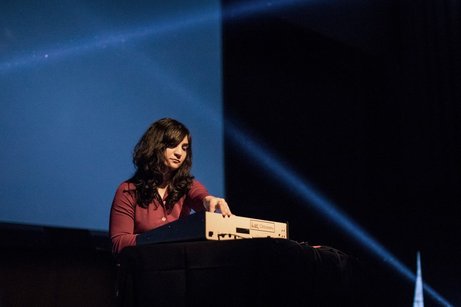
Canadian composer Sarah Davachi returns to Chicago and presents new work for reed organ, violin, viola da gamba and electronics. Based upon variously displaced melodic movements that were originally developed through a series of improvisations for pipe organ, this piece attempts to balance instances of consonance and dissonance, both in frequency content and physical gesture between its three players.
Joining Davachi in this performance are Chicagoans Whitney Johnson on violin and Phillip Serna on viola da gamba.
Sarah Davachi (b.1987, Calgary, Canada) is a composer of electronic and electroacoustic music. Trained at Mills College, she is engaged in practices of analog synthesis, psychoacoustic manipulations, multi-channel sound diffusion, and studio composition. Her compositional projects are primarily concerned with disclosing the antiquated instruments and forgotten sonics of a bygone era in synthesis, with concurrent treatment of acoustic sources—particularly organs, strings and woodwinds. Since 2007, she also has worked for the National Music Centre in Canada as a researcher and archivist of their collection of acoustic and electronic keyboard instruments. She has held artist residencies at the Banff Centre for Arts; EMS, Stockholm; OBORO, Montreal; and STEIM, Amsterdam. Davachi currently lives in Los Angeles, where she is a doctoral student in musicology.
Since 2010 the Graham Foundation has supported and partnered with Lampo to produce this performance series held at the Madlener House. Lampo, founded in 1997, is a non-profit organization for experimental music and intermedia projects.
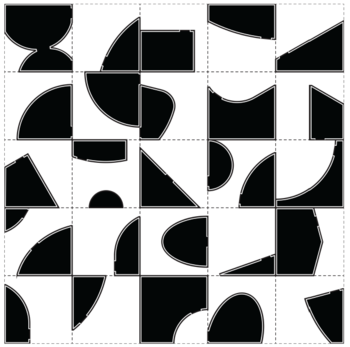
Renewed Archetypes, Endless Enclosure, Mystical Grid, Transient Monument, Inhabitable Wall, Dysfunctional Plan
Join us for a talk by Fosco Lucarelli, the 2017–18 Douglas A. Garofalo Fellow from the University of Illinois at Chicago (UIC) School of Architecture.
Dysfunctional Plans is a theoretical inquiry based on seven design exercises made in collaboration with a group of Lucarelli’s students. The project’s unwieldy brief provides no a priori function, content, strategy, site, or hypothetical condition apart from the arbitrary definition of seven oxymoronic images.
More an experiment than a manifesto, this talk and accompanying exhibition at UIC questions whether architecture might be a discipline autonomous enough to create its own narrative, content, function, purpose, and imagination—and therefore, meaning—stemming solely from its bare form.
Fosco Lucarelli is an Italian architect and educator based in Paris. He holds a Bachelor and Master of Architecture from the School of Architecture of Rome (Roma Tre) and from the ETSAM in Madrid. With his partner Mariabruna Fabrizi, he co-founded the architectural practice Microcities, and conducts independent research through the website SOCKS. He has taught at the École d'architecture de la ville et des territoires in Marne-La-Vallée in Paris, and at the École Polytechnique Fédérale in Lausanne. Together with M. Fabrizi, Lucarelli was the content-curator for "The Form of Form", the main exhibition at the 2016 Lisbon Architecture Triennale, and he is part of the chief curatorial team for the 2019 Lisbon Triennale.
About the Douglas A. Garofalo Fellowship
Named in honor of architect and educator Doug Garofalo (1958–2011), this nine-month teaching fellowship—supported with a grant from the Graham Foundation—provides emerging designers the opportunity to teach studio and seminar courses in the undergraduate and graduate programs and conduct independent design research. The fellowship also includes a public lecture at the Graham Foundation and an exhibition at the UIC School of Architecture. To learn more about the fellowship, click here.
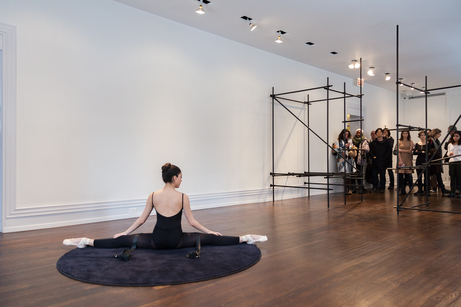
Please join us for the final performance related to our current exhibition, Brendan Fernandes: The Master and Form featuring dancers from the Joffrey Academy of Dance. The durational performance will activate the installation, designed in collaboration with Norman Kelley.
The Joffrey Academy of Dance, Official School of The Joffrey Ballet, is committed to providing students of all ages, levels and backgrounds who have a desire to dance with a world-class education built on a foundation of classical ballet. With the talents cultivated at the Joffrey Academy, students can pursue careers as professional dancers at companies throughout the world, higher education opportunities in dance, or success in other fields. Through the Joffrey Academy’s programs, students develop a diverse set of skills including artistry, creativity, discipline and confidence, among others. The Joffrey Academy’s high-quality, educational programming forms future audiences and support for the Joffrey and builds the organization’s reputation worldwide.
Image: View of "Brendan Fernandes: The Master and Form." 2018, Graham Foundation, Chicago. Installation in collaboration with Norman Kelley; dancers: Satoru Iwasaki, Yuha Kamoto, Andrea de León Rivera, Antonio Mannino, Leah Upchurch; photo: RCH
Unless otherwise noted,
all events take place at:
Madlener House4 West Burton Place, Chicago
GALLERY AND BOOKSHOP HOURS
2025 Chicago Architecture Biennial
SHIFT: Architecture in Times of Radical Change
Sep 19, 2025–Feb 28, 2026
Wed–Sat, 12–5 p.m.
CONTACT
312.787.4071
info@grahamfoundation.org
Accessibility
Events are held in the ballroom on the third floor which is only accessible by stairs.The first floor of the Madlener House is accessible via an outdoor lift. Please call 312.787.4071 to make arrangements.
Copyright © 2008–2026 Graham Foundation. All rights reserved.
 PREVIOUS POSTS
PREVIOUS POSTS